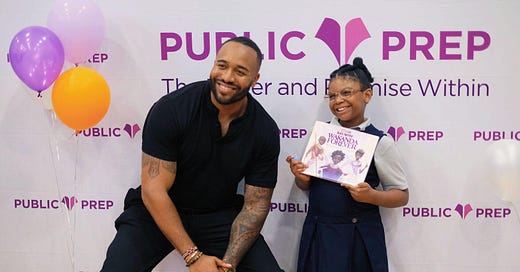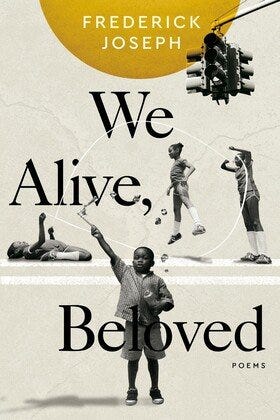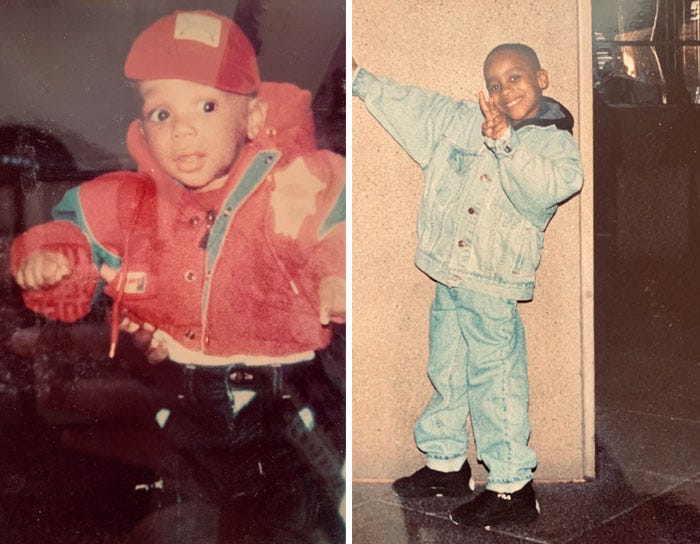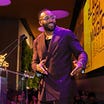Hi sweet reader! Today, I’m making an executive decision to ignore the news about killer robots and the fact that a portion of the Republican platform is inexplicably in all caps, to offer you something much softer and sweeter: a conversation with one of my favorite writers, the phenomenal Frederick Joseph. For those who are already fans, you know you're in for something extraordinary.
Frederick Joseph is a serial bestselling author with a stellar substack called In Retrospect, but he’s also renowned for his impactful community efforts. He spearheaded the Black Panther project, raising over one million dollars to ensure young Black children could experience the groundbreaking film in theaters and organized a campaign for young girls to see Captain Marvel, amplifying representation in cinema. Frederick is like if Mother Theresa was a dude with tattoos.
Frederick’s latest book of poetry, "We Alive, Beloved," is a tour de force, delving deeply into themes of Blackness, masculinity, and global interconnectedness. His work masterfully blends the personal with the political, leaving readers both moved and inspired. Given the significant overlap in our audiences, we knew that this collaboration and conversation between us would be a perfect fit. And let me tell you, his insights are just as compelling as his verses. I hope you enjoy our chat!
LP: First off, I noticed that 'We Alive, Beloved,' despite its profound themes and beautiful writing, hasn't garnered as much media attention as your other books. Why do you think poetry from Black men often struggles to capture mainstream media interest? What does this say about societal expectations and perceptions of Black men and their artistic expressions?
FJ: First, thank you, Liz. Not only for supporting this collection, but my work generally. It's a true honor, as your writing and heart are nothing but love and brilliance.
As far as the muted media response to "We Alive, Beloved" goes, I believe it reflects a broader societal discomfort with confronting the full humanity of Black men. Our society often confines Black men to rigid stereotypes, limiting our expressions to anger, athletic prowess, or hypermasculinity. When a Black man dares to present his vulnerability, his introspection, and his poetic sensitivity, it disrupts these narrow confines, challenging the collective comfort zone. Poetry, with its demand for deep emotional engagement and introspection, exposes these unseen facets of Black existence, which many are either unwilling or unprepared to acknowledge. This reluctance to embrace the multifaceted nature of Black men speaks volumes about the persistent societal expectations that continue to pigeonhole Black men's identities.
Moreover, the lack of media attention suggests that society, by and large, still views Black men through a lens that prioritizes sensationalism over substance, and spectacle over sincerity. This disregard is not just an oversight but a deliberate neglect that mirrors a refusal to grapple with the complexities and profundities of Black life. It calls into question the inclusivity of our cultural spaces and the sincerity of our professed commitments to diversity and equity in the arts.
[…] society, by and large, still views Black men through a lens that prioritizes sensationalism over substance, and spectacle over sincerity.
LP: That’s fascinating. Why do you think we’re so uncomfortable with the emotions of Black men? And who benefits from their suppression?
FJ: The broad discomfort with the emotions of Black men is deeply rooted in a historical fear of our wholeness. This unease stems from a long legacy of dehumanization and control, designed to maintain a social order that subjugates Black people. By suppressing the emotional expression of Black men, society perpetuates a myth of invulnerability and danger, which justifies our marginalization and the systemic violence against us. This suppression benefits those who hold power within this racial hierarchy, as it prevents the full acknowledgment of Black men's propensity for joy, pain, love, laughter, loss, and deserved rage.
The broad discomfort with the emotions of Black men is deeply rooted in a historical fear of our wholeness.
LP: That’s so true and that’s why I’m such a big fan of your work, because you really delve into the personal and collective trauma, resilience of communities that often don’t get heard. Why do you think these narratives, especially when told by Black men, are often overlooked or undervalued in mainstream literary circles? What change would you like to see in how these stories are received? Given the historical and ongoing contributions of Black poets, why do you think there is still a struggle for mainstream acknowledgment and appreciation of their work?
FJ: The narratives of trauma, resilience, and identity told by Black men are often overlooked because they compel society to confront truths about its history and its present. Our great Black poets of yesterday, like Langston Hughes and Claude McKay, laid the groundwork for this profound storytelling, yet even today, poets like Mahogany L. Browne and Tracy K. Smith are not receiving the recognition they so richly deserve. This continued marginalization reflects a broader resistance to valuing Black experiences on our own terms. The mainstream literary circles are steeped in a tradition that prioritizes whiteness, and often fail to appreciate the depth and nuance of Black poets' and writers' contributions. This oversight is not merely a matter of taste but of power, where the dominant narrative is preserved at the expense of the diverse and rich expressions of Black life. I cling to the dream of a literary world where these stories are not just included but celebrated, where the emotional and intellectual labor of Black artists is recognized as essential to the fabric of our collective consciousness.
LP: I think it’s so beautiful that you’re simultaneously transforming these systems both with your work and with the money that you make from it. I love that a portion of the profits from your book goes to the Palestinian Children’s Fund and Friends of the Congo, but from what I gather, your support for children in Gaza has led to the suppression of your content (I’ve certainly experienced that too). Can you explain why you view Black liberation as intrinsically connected to the struggle of freedom for those in Palestine?
FJ: The histories of Black people and Palestinians are interwoven with narratives of displacement, disenfranchisement, and resistance against forces that seek to dehumanize and control. Supporting the Palestinian cause is a recognition that the fight for justice knows no borders, and that our struggles are interconnected. This solidarity is not just an act of empathy but a strategic alliance against global systems of power that perpetuate inequality and violence. By standing with Palestinians, we affirm that the quest for liberation, dignity, and human rights is a universal endeavor.
LP: Shifting back to what’s happening in the US, you highlighted that abortion bans, while disproportionately affecting Black and Brown women in the South, are inherently racist and ultimately detrimental to everyone. Can you discuss how these restrictions serve as a form of racial oppression and why, like all forms of racism, they will eventually have negative repercussions for white people and society as a whole? Additionally, how do these bans impact Black men specifically?
FJ: Abortion bans are rooted in a history of controlling the bodies and reproductive rights of marginalized communities, perpetuating a cycle of poverty and disenfranchisement. By forcing women to carry unwanted and/or unhealthy pregnancies, these laws undermine their autonomy and economic stability, exacerbating systemic inequities. For Black men, these bans have profound implications as well, as we too are entangled in the socio-economic fallout, facing increased financial and emotional burdens as partners and fathers. The inability for our partners and loved ones to access safe reproductive healthcare further entrenches economic and social disparities, reinforcing the very structures of oppression that Black men have long struggled against for centuries.
LP: Speaking of family systems, your work deeply explores the inherent hope found in childhood. Can you discuss how we can carry that sense of hope into our adulthood, even when we become hardened by societal challenges? What practices or mindsets do you believe are essential for maintaining that hope?
FJ: Carrying the hope of childhood into adulthood requires us to cultivate a practice of wonder, to look at the world not only with our eyes but with our hearts. We must nurture the delicate art of seeing beauty in the mundane, of finding poetry in the everyday. I believe this means allowing ourselves to be vulnerable, to embrace our scars not as symbols of defeat but as emblems of survival and growth. It is through acts of kindness, both given and received, that we keep the flame of hope alive. To maintain my hope, I surround myself with people who believe in my light, who see the infinite possibilities within me. I also constantly engage with art, nature, and stories that remind me of the interconnectedness of it all.
Carrying the hope of childhood into adulthood requires us to cultivate a practice of wonder, to look at the world not only with our eyes but with our hearts.
LP: I love the way you put it, seeing wonder as a practice to cultivate, rather than simply a feeling. I’d love to finish our conversation with a question I ask all of our featured speakers: what is the last thing that gave you hope?
FJ: The last thing that gave me hope was receiving about 25 thank you letters and crayon-drawn cards from first graders who read my Black Panther: Wakanda Forever picture book. Those heartfelt messages, crafted with such innocence and joy, reminded me that my work matters. Children remind me to keep hoping constantly.
LP: I love that! You make the world so much better just by being in it. Thank you for taking the time to give back to our community, we can’t wait to have you at our next sharing circle!
To support Frederick’s work you can subscribe to his substack and buy his latest book We Alive, Beloved from your local bookstore!
Exclusive Event for Paid Subscribers! 🌟
If you loved the wisdom that Frederick had to share, you won't want to miss our upcoming live event with him on August 4th at 9amPT/Noon. Join us for a unique sharing circle where Frederick will delve deeper into the topic of MALE LIBERATION. It's a chance for all of us to connect, learn, and build together—because that's what democracy in action is all about. Sharing circles are designed to foster meaningful change through fellowship and friendship. By providing a space for open dialogue and mutual support, our sharing circles are meant to cultivate deeper connections. My hope is that they create a ripple effect of empathy, collaboration, and positive transformation within our communities. In this environment of trust and reciprocity, sharing circles inspire personal growth, strengthen bonds, and ignite collective action toward a more inclusive and compassionate society. You can join from anywhere, and everyone is welcome. Your membership helps pay the rent for zoom and cover the overhead costs of running these events. Thank you for your contribution and your presence!
x
Liz










Thank you for this honor, my friend.
who benefits from your self-suppression?